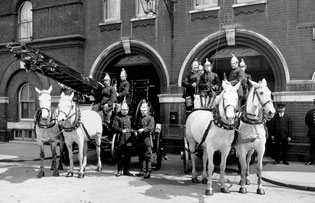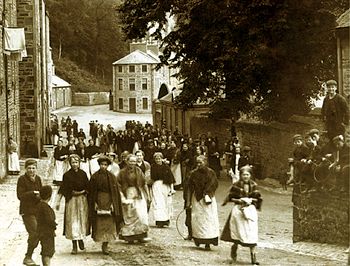Queen Victoria (1819-1901) was the first English monarch to see her name given to the period of her reign whilst still living. The Victorian age was characterized by rapid change and developments in nearly every sphere, from advances in medical, scientific and technological knowledge to changes in population growth and location.
Over time, this rapid transformation deeply affected the country’s mood: an age that began with a confidence and optimism leading to economic boom and prosperity eventually gave way to uncertainty and doubt regarding Britain’s place in the world.

Family Life
For the most part, nineteenth-century families were large and patriarchal. They encouraged hard work, respectability, social deference and religious conformity. While this view of nineteenth-century life was valid, it was frequently challenged by contemporaries. Women were often portrayed as Madonnas or the opposite, yet increasing educational and employment opportunities gave many a role outside the family.
Read about the birthday celebrations during the Victorian era.
Innovation impact on daily life
In science and technology, the Victorians invented the modern idea of the invention — the notion that one can create solutions to problems, that man can create new means of bettering himself and his environment.

Politics
Politics was important to the Victorians; they believed in the perfection of their evolved representative government, and in exporting it throughout the British Empire. This age saw the birth and spread of political movements, most notably socialism, liberalism and organized feminism.
Exploration
British Victorians were excited by geographical exploration, by the opening up of Africa and Asia to the West, yet were troubled by the intractable Irish situation and humiliated by the failures of the Boer War. At sea, British supremacy remained largely unchallenged throughout the century.
Influence of Religion
In religion, the Victorians experienced a great age of doubt, the first that called into question institutional Christianity on such a large scale. In literature and the other arts, the Victorians attempted to combine Romantic emphases upon self, emotion, and imagination with Neoclassical ones upon the public role of art and a corollary responsibility of the artist.
Ideology
In ideology, politics, and society, the Victorians created astonishing innovation and change: democracy, feminism, unionization of workers, socialism, Marxism, and other modern movements took form. In fact, this age of Darwin, Marx, and Freud appears to be not only the first that experienced modern problems but also the first that attempted modern solutions.
Victorian, in other words, can be taken to mean a parent of the modern and like most powerful parents, it provoked a powerful reaction against itself. Whilst this brief overview can only partially summarize some characteristics of the nineteenth century, it does illustrate that society was disparate and that no one feature can serve to give a definitive view of what it meant to be “Victorian”.